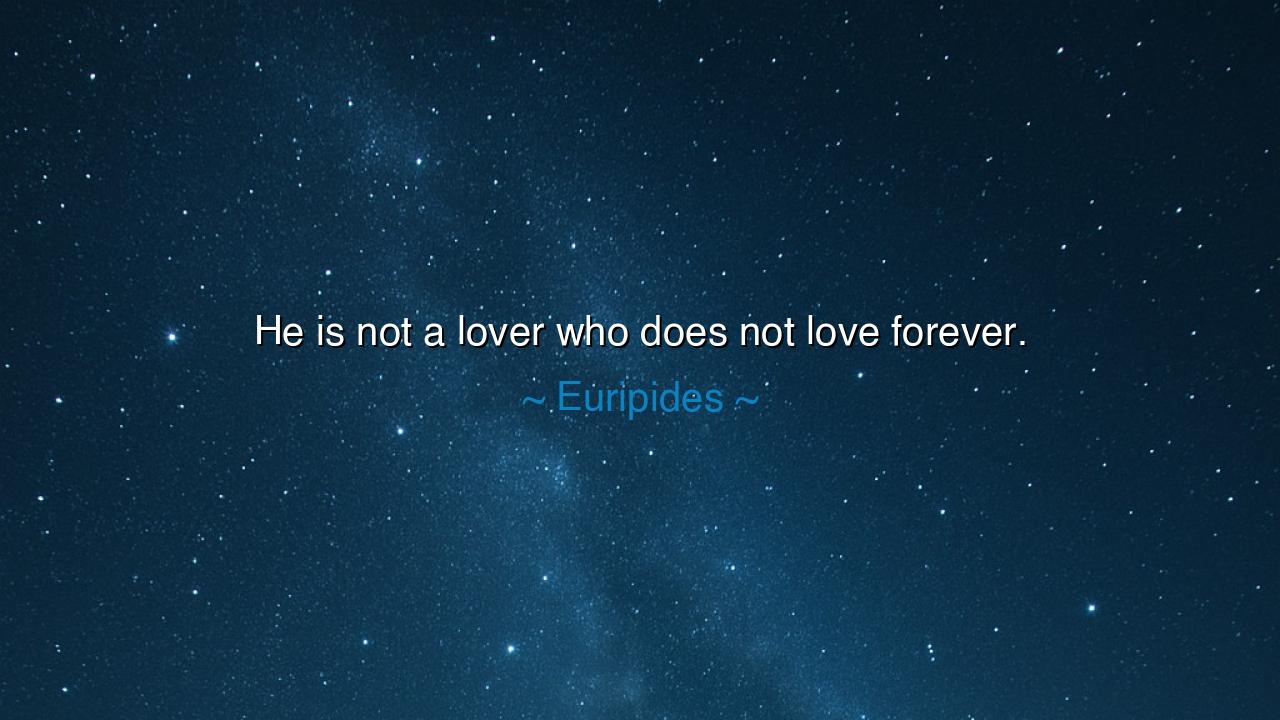
He is not a lover who does not love forever.






"He is not a lover who does not love forever." These words, spoken by the ancient playwright Euripides, resonate with timeless wisdom about the nature of true love. In a world where passions often burn bright and fade just as quickly, Euripides reminds us that true love is not a fleeting emotion or a temporary feeling. It is eternal, a force that endures through the seasons of life. To love forever is to love with depth, with commitment, and with a heart that remains unwavering, regardless of the challenges or the passage of time. Love that is genuine does not diminish when the initial excitement fades, but grows stronger, evolving with the changing tides of life.
In the ancient world, love was seen as a sacred bond that transcended mere physical attraction or temporary infatuation. The Greeks spoke of love in many forms—Eros, the god of passionate love, Philia, the love of friendship, and Agape, the selfless love that connects all people. Euripides, in his exploration of love in the context of human relationships, suggested that Eros, when true, does not simply burn brightly and then fade. It is not about the fire of instant attraction or the rush of the beginning stages of a relationship. True love, the love that is worth pursuing, endures through trials and difficulties, growing stronger with time. A lover who loves only for a moment is not a true lover, for true love is something that remains steadfast, even when the winds of life threaten to blow it away.
The story of Orpheus and Eurydice is an ancient example of this eternal love. Orpheus, the great musician, fell deeply in love with Eurydice. When she tragically died, Orpheus descended into the underworld, determined to retrieve her. His love for her was so profound that it led him to risk everything for a chance to bring her back to life. His love was not transient—it was eternal. Even in the face of death, Orpheus's love remained strong and unyielding. Though he ultimately lost her again, his devotion was unwavering. In this tragic tale, we see that true love, according to Euripides, is a love that does not end, a love that is unshaken by circumstances, death, or hardship.
Similarly, the love between Antony and Cleopatra demonstrates the eternal nature of true affection. Though their relationship was complicated by politics and betrayal, their passion for each other never truly faded. Even in the face of looming defeat, Antony’s love for Cleopatra remained his guiding force. He chose to die beside her rather than live without her, demonstrating the depth of their commitment. Their love, marked by intense emotion and devotion, continued to define their lives and their legacies long after their deaths. Through their eternal love, we see that love does not simply exist for a season—it becomes a legacy, something that transcends time, death, and tragedy.
Euripides teaches us that love cannot be defined by fleeting feelings or temporary attraction. True love is not a simple affair that comes and goes with the passing seasons. It is a commitment, an act of the heart and will that persists, that remains constant, even when external circumstances change. A lover who loves only when it is easy, only when the passion burns brightly, is not truly in love. To be a true lover is to commit to steadfastness, to love with an unwavering heart, not because of fleeting desire, but because love is a chosen path, a journey that endures through time.
The lesson Euripides imparts is this: love is not a momentary feeling but an eternal commitment. The true test of love lies not in the intensity of its beginnings but in the strength of its endurance. True love is a fire that does not extinguish but grows brighter with each passing trial. It is commitment, devotion, and loyalty over time. It asks us to love even when circumstances are difficult, when the initial passion fades, and when challenges arise. True love does not come with an expiration date—it endures and evolves as we do.
In your own life, reflect on your relationships and ask yourself: Do you love with the depth and commitment that lasts beyond the initial stages? Are you willing to endure the inevitable struggles and challenges that come with time? Love forever, as Euripides says, not just with the heart, but with your actions, your patience, and your dedication. Let your love be a reflection of something eternal, something that transcends the moment and grows stronger with each day. When you love in this way, you not only honor the other person but also honor the true nature of love itself.






AAdministratorAdministrator
Welcome, honored guests. Please leave a comment, we will respond soon